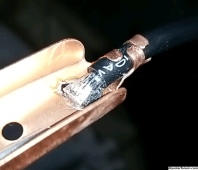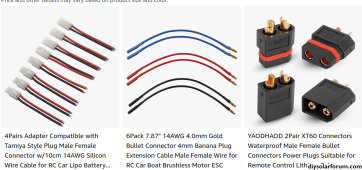This device is meant to test/charge batteries which means it's running like 10 hours or even more at a time.
It is rated for 40 amps but it has a 10 gauge wire. (3.2mm)
It gets warm and I've been running it at 34 amps.. but not hot.. warm.
I know all the ratings all over the internet say 30amps max for 10ga which is why I wonder.
Looking up metric ratings (for that size of wire in mm) they seem to recommend even lower amperage..
The connections are going to support 40amp? (picture 1)
I know someone's going to come in here and say "it doesn't melt itself until 50amps!" or something but just curious what people think about the 40 amps
Also they must exist, what are the plugs for an RC car for 40 amps or some other type of plugs so I can plug different connectors into the end of the wire?
In picture 2 you can see some but only 1 is rated at 40 amps for a split second then it's continuous current is 20 amps
It is rated for 40 amps but it has a 10 gauge wire. (3.2mm)
It gets warm and I've been running it at 34 amps.. but not hot.. warm.
I know all the ratings all over the internet say 30amps max for 10ga which is why I wonder.
Looking up metric ratings (for that size of wire in mm) they seem to recommend even lower amperage..
The connections are going to support 40amp? (picture 1)
I know someone's going to come in here and say "it doesn't melt itself until 50amps!" or something but just curious what people think about the 40 amps
Also they must exist, what are the plugs for an RC car for 40 amps or some other type of plugs so I can plug different connectors into the end of the wire?
In picture 2 you can see some but only 1 is rated at 40 amps for a split second then it's continuous current is 20 amps




